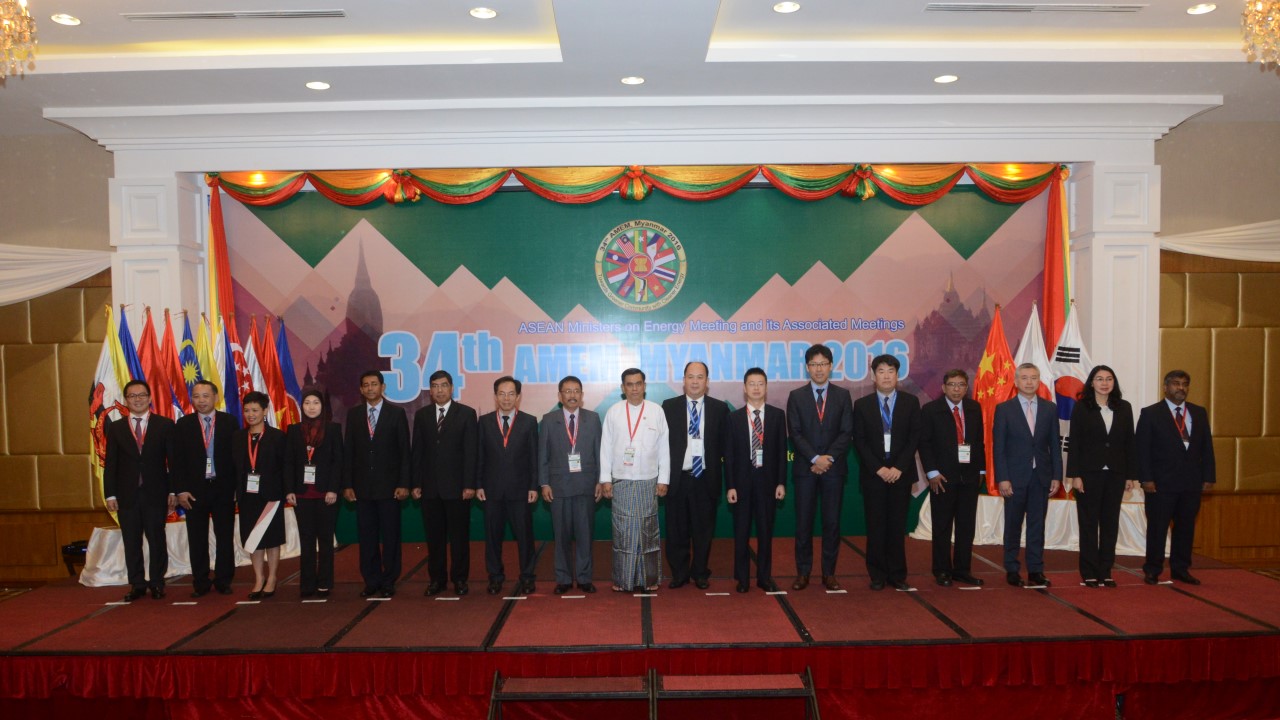Menu

With the theme ‘Towards a Greener Community with Cleaner Energy’, 10 (ten) ASEAN Senior Officials on Energy (SOE) Leaders gathered in Nay Pyi Taw, Myanmar for The 15th Senior Officials Meeting on Energy Plus Three—China, Japan, Korea—(SOME+3) Preparation on 20 September 2016. The Meeting discussed the progress achieved by ASEAN in the energy sector for the period of 2015-2016. It also adopted the proposed work plan for 2016-2017.
The Preparatory Meeting for the 34th ASEAN Ministers on Energy Meeting (AMEM) was chaired by Mr. Htein Lwin, SOE Leader of Myanmar, and co-chaired by three people: Mr. Hu Jianwu, Director, Division of Asia, Africa, and South America, National Energy Administration (NEA) of China; Mr. Katsushi Takehiro, Director, International Energy Strategy Office, International Affairs Division, Agency for Natural Resources and Energy, Ministry of Economy, Trade and Industry of Japan; and Dr. Chung Woongtae, Senior Researcher, Korea Energy Economics Institute. The Meeting was also attended by delegates from the ASEAN Secretariat, Heads of ASEAN Power Utilities/Authorities (HAPUA), ASEAN Council on Petroleum (ASCOPE), and the ASEAN Centre for Energy.
In his opening remarks, Mr. Htein Lwin, the SOE Leader of Myanmar recognised that civilian nuclear energy is an alternative to reduce the greenhouse gas (GHG) emissions. He added that though civilian nuclear technology is still far away from the commencement stage, ASEAN needs to study and learn more about the development of nuclear technology as part of an important alternative in the future.
Against the backdrop of the Paris Climate Conference 2015 (United Nations Framework Convention on Climate Change’s 21st Conference of the Parties) that was adopted and endorsed by 195 countries, the Meeting agreed that ASEAN+3 activities should be directed to reduce GHG emissions and to step up measures for low carbon technologies to enhance energy security and environmental protection. In this regard, the Meeting encouraged China, Japan, and Korea to continue their strong support to ASEAN in reducing the emissions and achieving the ASEAN Plan of Actions for Energy Cooperation (APAEC)’s targets by 2025. As a supplemental reading on the progress and plans for enhancing ASEAN+3 collaboration, the Joint Ministerial Statement of the 13th AMEM+3 is downloadable here. (SBS, photo credit: MOEE, Myanmar)
With the theme ‘Towards a Greener Community with Cleaner Energy’, 10 (ten) ASEAN Senior Officials on Energy (SOE) Leaders gathered in Nay Pyi Taw, Myanmar for The 15th Senior Officials Meeting on Energy Plus Three—China, Japan, Korea—(SOME+3) Preparation on 20 September 2016. The Meeting discussed the progress achieved by ASEAN in the energy sector for the period of 2015-2016. It also adopted the proposed work plan for 2016-2017.
The Preparatory Meeting for the 34th ASEAN Ministers on Energy Meeting (AMEM) was chaired by Mr. Htein Lwin, SOE Leader of Myanmar, and co-chaired by three people: Mr. Hu Jianwu, Director, Division of Asia, Africa, and South America, National Energy Administration (NEA) of China; Mr. Katsushi Takehiro, Director, International Energy Strategy Office, International Affairs Division, Agency for Natural Resources and Energy, Ministry of Economy, Trade and Industry of Japan; and Dr. Chung Woongtae, Senior Researcher, Korea Energy Economics Institute. The Meeting was also attended by delegates from the ASEAN Secretariat, Heads of ASEAN Power Utilities/Authorities (HAPUA), ASEAN Council on Petroleum (ASCOPE), and the ASEAN Centre for Energy.
In his opening remarks, Mr. Htein Lwin, the SOE Leader of Myanmar recognised that civilian nuclear energy is an alternative to reduce the greenhouse gas (GHG) emissions. He added that though civilian nuclear technology is still far away from the commencement stage, ASEAN needs to study and learn more about the development of nuclear technology as part of an important alternative in the future.
Against the backdrop of the Paris Climate Conference 2015 (United Nations Framework Convention on Climate Change’s 21st Conference of the Parties) that was adopted and endorsed by 195 countries, the Meeting agreed that ASEAN+3 activities should be directed to reduce GHG emissions and to step up measures for low carbon technologies to enhance energy security and environmental protection. In this regard, the Meeting encouraged China, Japan, and Korea to continue their strong support to ASEAN in reducing the emissions and achieving the ASEAN Plan of Actions for Energy Cooperation (APAEC)’s targets by 2025. As a supplemental reading on the progress and plans for enhancing ASEAN+3 collaboration, the Joint Ministerial Statement of the 13th AMEM+3 is downloadable here. (SBS, photo credit: MOEE, Myanmar)
